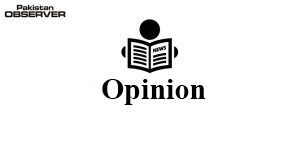Articles and letters may be edited for the purposes of clarity and space. They are published in good faith with a view to enlightening all the stakeholders. However, the contents of these writings may not necessarily match the views of the newspaper.
Jinnah and his Constitutional State
Pakistan, today suffers because we betrayed Quaid’s vision for establishing a modern democratic welfare state, where the will of the people would reign supreme and Constitution would be the supreme law to which all state institutions must submit and perform their designated roles. We suffered humiliation of surrender in 1971, allowing our sovereignty to be compromised by involvement in proxy wars. Our salvation lies in adopting Jinnah Doctrine in letter and spirit.
Quaid-i-Azam in his first address to the Constituent Assembly on 11 August 1947 stated that “first is the very onerous and responsible task of framing the future Constitution of Pakistan and the second of functioning as a full and complete sovereign body as the Federal Legislature of Pakistan” with “all the powers’’. He referred to the creation of Pakistan as “unprecedented cyclonic revolution” where affairs of the state would be decided by their elected representatives through free and fair elections.
MAJ referred to the institutionalized corruption which British Raj had infected India through allotment of land and titles to those who collaborated with them for prolonging their occupation as a curse of bribery and corruption, which “must be put down with an iron hand”. He referred to Black Marketing and Hoarding of essential food items as a grievous crime “because they undermine the entire system of control and regulation of food-stuffs and essential commodities, and cause wholesale starvation and want and even death”.
While addressing the officers at Staff College Quetta on 14 June 1948, MAJ stated that “the executive authority flows from the Head of the Government of Pakistan” and therefore any command or orders that may come to you cannot come without the sanction of the Executive Head”. He reminded them of their oath which binds them to uphold the Constitution and obey the elected executive head, with no role for them in politics.
MALIK TARIQ ALI
Lahore
Education system
Presently various types of education systems are prevailing in our country. Madaris follow their own curriculum while government and private schools follow entirely different modes. Getting good, quality and uniform education is the right of every citizen as clearly mentioned in the constitution.
Situation on the ground is quite different and pathetic as large number of children having no access to schools or no sources to afford good education though they may be capable enough. Unfortunately so far governments could not do well to tackle this issue. Another challenging point is SNS (Special Needs Students) who are physically or mentally abnormal. Such children are part of every community in the world and how our system would deal with these 10 to 12% students.
Curriculum is not enough to reduce inequality we have in our education system rather if focus is only on this, it would give rise to other issues that would make it more complex. To sum up, government must look into various issues related to geographical division, linguistics barriers and alienation from each other, gender discrimination etc.
ATTIQA REHMAN
Islamabad
Media role
The print and electronic media plays a vital role in keeping public informed of what is happening in the county and world around. However, when it comes to reporting matters of political nature, it becomes a bit complex. As humans, it is natural to have likes or preferences for people, parties, and events. However, it is expected from media persons to rise above their personal likes, dislikes and report the truth. Unfortunately, truth can also be spun in many ways. Like it can be presented in a way that makes one side guilty and other innocent and vice versa.
Such biases even cloud the judgment of media persons as well as listeners. Such an approach is dangerous as it creates division among masses creating more confusion and at times anarchy. Our media groups should realise this and stick to honest and unbiased reporting. They should try to work to bridge differences in an already frustrated and divided nation.
NOMAN KHAN
Islamabad
Street crimes
Street crime is a loose term for criminal offences taking place in public places. Nowadays street crimes are commonplace in Pakistan. Especially in Karachi this occurs in busy business areas and on highways. This include pick pocketing, mobile snatching, wallet snatching, cars and auto snatching on gun points, target killing, purse snatching from women’s.
Street crimes affect our neighbourhood and our society. These crimes bring instability in our society, cities and streets. Nowadays every individual has a story of mobile and wallet snatching. Mostly people experience street crimes, yet police and other related government institutions don’t take action against these robbers and it has become a real menace for the citizens.
The major causes of street crimes are unemployment, illiteracy, poverty but there are some other factors like lawlessness, extremism and backwardness. Government must take serious steps to control street crimes.
KHAWAJA SHAIR ALI
Karachi










